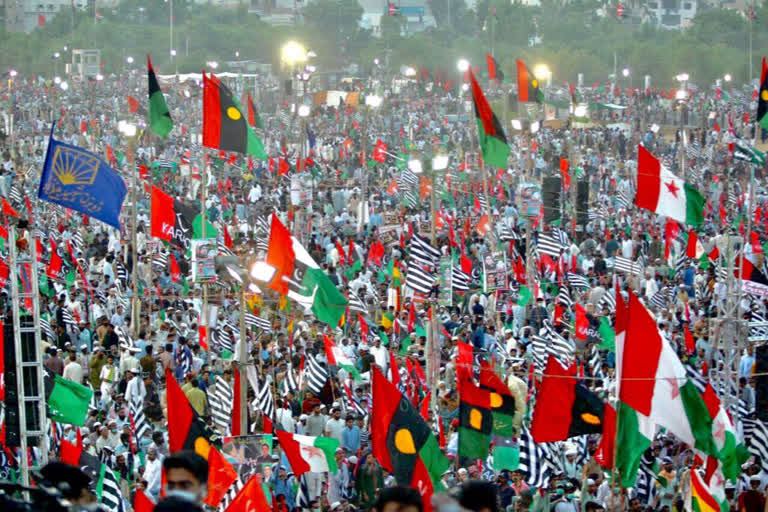New Delhi: The PDM (Pakistan Democratic Movement) which is an 11-party alliance of anti-government political parties, staged its third street protest in Quetta on Sunday, pointing to a complex churning in the domestic power dynamic of Pakistan.
The fiery address by former Prime Minister Nawaz Sharif through a video-link from London is also indicative of the return to the 'akhara' (wrestling arena) of Pakistan's most senior and experienced political leader who has been vilified, arrested and jailed by the Army since the General Musharraf coup of 1999.
The current Imran Khan-led PTI government in Pakistan that assumed office in August 2018 is seen to be one 'selected' by the army in Rawalpindi and PM Khan is perceived to be beholden to the army chief General Qamar Javed Bajwa. The latter was accorded an extension of service by Khan which raised more than an eyebrow and this in turn, has resulted in an army chief-PM dependency that is not unfamiliar in the Islamabad-Rawalpindi relationship. Ironically, in his first stint as Prime Minister in November 1990, Nawaz Sharif was also seen as a civilian politician who was 'preferred' by the army at the time.
Two years of inept governance dominated by a single-point agenda of targeting political opponents by the Imran Khan government has led to growing disaffection in the Pakistani streets and this was the catalyst for the formation of the PDM in September. The main opposition parties comprising the four big boys -- the PML-N (Pakistan Muslim League-Nawaz); PPP (Pakistan People's Party); JuI-F (Jamiat Ulema-e-Islam-Fazlur) and the Pakhtunkhwa Milli Awami Party form the core. The other parties include the Baloch National Party and the Pashtun Tahaffuz Movement, all of whom have set aside their differences to form the PDM.
Read:US-Taliban peace deal: Implications for India
The President of this anti-Imran Khan alliance is veteran Pashtun leader Fazlur Rehman of the JuI(F) and the more visible younger leaders include Maryam Nawaz, the Vice President of the PML-N who is the daughter of Nawaz Sharif; and PPP Chairperson Bilawal Bhutto Zardari – grandson of Zulfiqar Ali Bhutto (former PM of Pakistan sent to the gallows by General Zia ul Haque) and son of Benazir Bhutto, also a former PM of Pakistan who was assassinated in December 2007.
In a clarion call that pitted the legitimacy and strength of the voter against the oppression of the army that has long wielded power in Pakistan, the three-time former PM Sharif asserted: "Looking at this enthusiasm, I am sure that no one will be able to violate the vote's respect now. I saw this enthusiasm in Gujranwala and Karachi, and now I'm seeing it in Quetta."
Sharif was referring to the democratic impulse visible in earlier back-to-back PDM street protests in Gujranwala, Punjab and Karachi, Sindh in mid-October. The Quetta, Balochistan protest on Sunday testifies to the reach of the PDM across the three largest and most populous provinces of Pakistan – Punjab, Sindh, and Balochistan and the signal to the Imran Khan government is unambiguous.
What is distinctive about the PDM stance is that for the first time in the public discourse of Pakistan – a former PM Nawaz Sharif has castigated the army in public and laid the blame for his own ouster at the door of General Bajwa.
